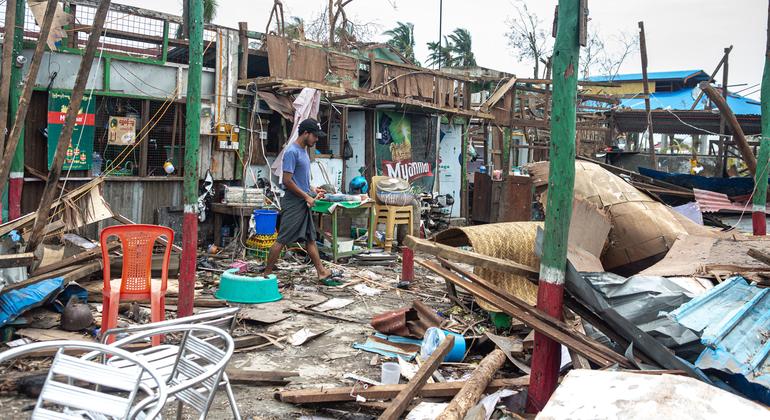Violent Turmoil in Myanmar Could Cause Headaches for Middle-class Folks
 The UN Development Programme (UNDP) has warned that poverty is surging and the middle class in Myanmar is “disappearing” amidst worsening insecurity and conflict.
The UN Development Programme (UNDP) has warned that poverty is surging and the middle class in Myanmar is “disappearing” amidst worsening insecurity and conflict.
In a new report published on Thursday UNDP said that the middle class has shrunk by half, compared with before the 2021 military coup, and that three quarters of the country’s population is either living in poverty or “perilously close” to the national poverty line.
“The new data show that less than 25 per cent of the population in Myanmar manage to secure steady incomes to live above the poverty line. Without immediate interventions to provide cash transfers, food security and access to basic services, vulnerability will keep growing, and impacts will be felt across generations” said Achim Steiner, UNDP Administrator.
Tweet URL
According to UNDP estimates, $4 billion per year is required to address ballooning poverty, via cash transfers and other means, to help families recover from the “L-shaped” recession amid plummeting economic activity and few signs of recovery.
“We call on all stakeholders – inside and outside Myanmar – to take action and preserve vulnerable households from slipping into irreversible poverty and despair” Mr. Steiner urged.
Zero spending on education
Polling over 12,000 households across Myanmar, the report also found that families and households have been forced to resort to various, often unsustainable, coping mechanisms.
Speaking to journalists at UN Headquarters in New York, Kanni Wignaraja, UNDP Regional Director for Asia and the Pacific, explained the dire situation.
“During the COVID-19 [pandemic], the spending on education was meagre – two to three per cent of household’s income – it is now close to zero,” she said, adding that families are pulling children out of school and unable to spend on healthcare and other basic services.
“We are going to see a whole generation that just has a learning and health deficit that is very scary,” she warned.
Regional picture
The report has also revealed an alarming picture at the provincial level.
The states with the lowest rates of per capita income are Kayah, Chin, and Sagaing – regions experiencing high levels of conflict between the junta forces and groups opposing.
In addition to heightened poverty levels, conflict-ridden were also marked by destruction of homes, restricted access to farmlands and an increase in internally displaced people (IDPs) – all leading to yet more hardship.
IDPs arriving in urban centres such as Yangon and Mandalay, both for safety and basic services, no longer have any safety net, Ms. Wignaraja said.

© UNODC
A poppy field in East Shan state, Myanmar.
Proliferation of organized crime
The UNDP Regional Director also emphasized the challenges posed by skyrocketing criminality in the southeast Asian nation.
She cited recent findings by the UN Office on Drugs and Crimes (UNODC) that Myanmar is the largest producer of opium and the massive proliferation of organized crime, especially the so called “scam centres”.
“If these illegal economic activities – where there is a lot of money involved – are not curbed, and we cannot restart intensive international and regional mediation efforts to stop the ongoing war, the story of Myanmar is going to be of the disappeared middle [class],” Ms. Wignaraja said.
Nora Chambers, an acclaimed journalist with a focus on global affairs and humanitarian issues, has dedicated over twenty years to reporting from conflict zones worldwide. Her work has spotlighted marginalized communities and highlighted urgent international concerns.




In my opinion, it’s heartbreaking to see the middle class disappearing in Myanmar due to the ongoing conflict and insecurity. The UNDP’s warning about surging poverty is alarming, and urgent measures need to be taken to prevent more families from falling into irreversible poverty.
As a concerned citizen, it’s disheartening to hear about the devastating impact of violent conflict on the middle class families in Myanmar. The statistics presented by UNDP are alarming, showing the urgent need for immediate interventions to prevent further hardships. I hope that adequate measures will be taken to support those most affected and rebuild a stable future for all citizens.
It’s heart-wrenching to see the middle class disappearing in Myanmar due to the escalating violence. Immediate interventions are crucial to prevent vulnerable families from slipping into irreversible poverty and despair. Let’s all come together to support those in need.
As a concerned citizen, I find it extremely disheartening to read about the dire situation in Myanmar. The disappearance of the middle class and the surge in poverty paint a bleak picture for the country’s future. Immediate interventions and support are crucial to prevent further devastation and ensure a stable future for all families affected by the conflict.
Do you think international assistance will be enough to prevent irreversible poverty for middle class families in Myanmar?
International assistance, while crucial, may not be sufficient to prevent irreversible poverty for middle class families in Myanmar. It requires a multi-faceted approach including local economic reforms, social safety nets, and sustainable development strategies to uplift the affected families. Collaborative efforts from both local and international actors are essential to address the root causes of poverty and provide sustainable solutions for long-term impact.
It’s really concerning to see how the violent conflict in Myanmar is impacting middle class families. The data shared by UNDP highlights the urgency of providing support to prevent more families from sliding into poverty. Immediate interventions are crucial to ensure a better future for the people of Myanmar.
It’s deeply concerning to see the impact of the violent turmoil in Myanmar on the middle class. The shrinking middle class and the rising poverty levels paint a bleak picture for the country’s future. Immediate interventions are crucial to prevent further deterioration and safeguard the vulnerable populations. Action needs to be taken now to address the growing poverty crisis in Myanmar.
As the situation in Myanmar worsens, it is truly disheartening to see the middle class disappearing and poverty surging. The UNDP’s report paints a bleak picture, highlighting the urgent need for interventions to prevent further suffering. It’s crucial that immediate action is taken to protect vulnerable households from irreversible poverty and despair, as the impacts will be felt for generations to come.
How can the shrinking of the middle class in Myanmar impact the global economy?
It’s heartbreaking to see the middle class in Myanmar disappearing due to the violent turmoil. Immediate interventions are crucial to prevent vulnerable households from falling into irreversible poverty and despair. The UNDP’s call for action is imperative to address the surging poverty and ensure the well-being of the people.
Do you think the government in Myanmar is adequately addressing the needs of the middle class during this violent turmoil?